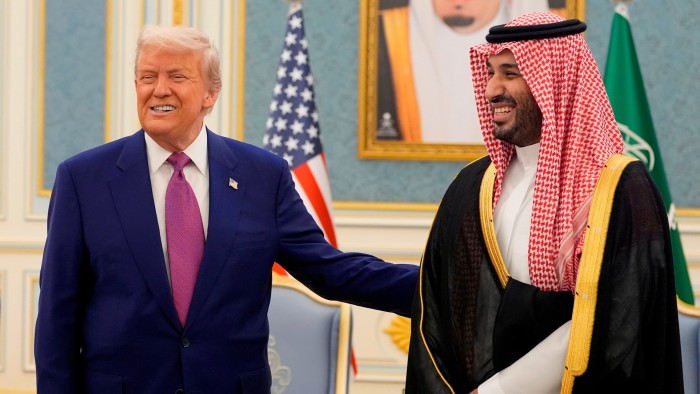The US and Saudi Arabia announced agreements the White House said were worth $600bn in sectors including artificial intelligence and defence, as President Donald Trump began the first leg of his dealmaking, three-nation tour of the oil-rich Gulf.
The deals unveiled on Tuesday included a commitment by Saudi Arabia’s new state-owned AI company, Humain, to build AI infrastructure in the kingdom using several “hundred thousands” of Nvidia’s most advanced chips over the next five years.
That would make it one of the biggest AI chip orders by a state company, underlining the scale of Crown Prince Mohammed bin Salman’s ambitions to position Saudi Arabia as a global AI hub and boosting Nvidia’s desire to build “sovereign AI” infrastructure around the world.
The first phase of Humain’s investment will involve deploying 18,000 of Nvidia’s latest “Blackwell” servers, the chipmaker said. Based on the price of a single Nvidia graphics processing unit, estimated to be between $30,000 and $40,000, the Saudi investment would run into multiple billions of dollars.
Nvidia shares were up more than 5 per cent on Tuesday.
The White House press release hailed “Saudi Arabia’s $600bn commitment to invest in the US” and “economic ties that will endure for generations to come”.
It also cited what it said was a “nearly $142bn” agreement to provide Riyadh “with state-of-the-art warfighting equipment and services from over a dozen us defence firms”.
It added this would include air force and space capabilities, missile defence, maritime and border security, land forces modernisation and communication systems upgrades.
The US also referred to plans by Saudi Arabian DataVolt to invest $20bn in AI data centres and energy infrastructure in the US.
But it did not immediately give a timeframe for the deals, which also include contracts for US groups to build infrastructure projects in the kingdom.
Trump is looking to secure deals and investment pledges worth more than $1tn on his trip to the Gulf, which will also include stops in Qatar and the United Arab Emirates.

The traditional US allies, are among the biggest buyers of American weapons, boast sovereign wealth funds that collectively manage in excess of $3tn and have all stated their ambitions to invest heavily in AI.
Many of the US’s most powerful tech executives were also in Riyadh, including Elon Musk, OpenAI’s Sam Altman and Nvidia’s chief executive Jensen Huang as Saudi Arabia hosted a glitzy investment forum. Top financiers including BlackRock’s Larry Fink, Blackstone’s Stephen Schwarzman and Citigroup’s Jane Fraser also attended.
US tech companies have been increasingly looking to the Gulf, which manages some of the world’s largest and most active sovereign wealth funds, to raise capital and lure investments.
The Gulf states, meanwhile, view AI as a critical part of their plans to diversify their economies away from oil and develop new industries, hoping to leverage their abundant energy resources and the financial muscle of their sovereign funds.
It comes as the Trump administration last week scrapped a Biden-era rule that would have seen Saudi Arabia, along with dozens of other countries including India and Singapore, face limitations on their purchases of the most powerful US-designed AI chips.
Riyadh launched Humain, which will be chaired by Prince Mohammed and owned by the Public Investment Fund, the $940bn sovereign wealth fund, to steer its strategy and investments in the sector on Monday, the day before Trump arrived.
Prince Mohammed has maintained good relations with Trump, and his son-in-law Jared Kushner, since the president’s first term. Just days after Trump’s inauguration in January, he committed Saudi Arabia to invest $600bn in the US over the next four years — the same amount that was announced on Tuesday.
The UAE followed up with a similar gesture, pledging in March to invest $1.4tn over the next 10 years. It is also seeking to establish itself as a leading AI hub and has taken a strategic decision to invest in US tech.
Analysts question how the Gulf states will be able to deploy such a vast scale of capital in the timeframes announced, particularly Saudi Arabia as it grapples with lower oil prices, a widening budget deficit and the massive scale of its own domestic projects.
Trump will fly to Qatar on Wednesday, with Doha expected to make its own pledge to invest hundreds of billions of dollars in the US.
But the president’s trip has been overshadowed by a controversy triggered by his decision to accept a $400mn jumbo jet from Qatar to temporarily replace Air Force One.
The Qatari gift is likely to be the largest by a foreign state or entity to a US president in recent history and has drawn criticism from Trump’s supporters as well as opponents.
Trump’s trip to the region comes at a time when the Middle East is still enduring the repercussions of the 19-months of conflict triggered in the wake of Hamas’s October 7 2023 attack and Israel’s retaliatory offensive in Gaza.
There has so far been little public mention of the region’s crises as Trump has focused on investment deals.
Additional reporting by Michael Acton in San Francisco


